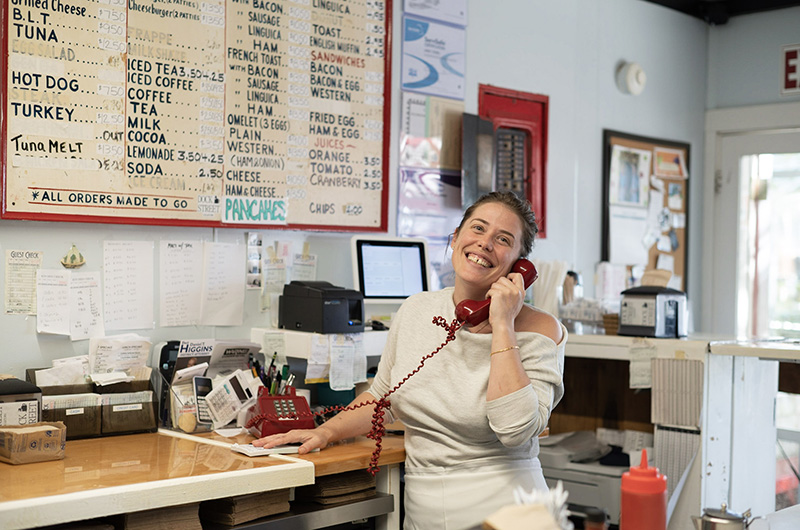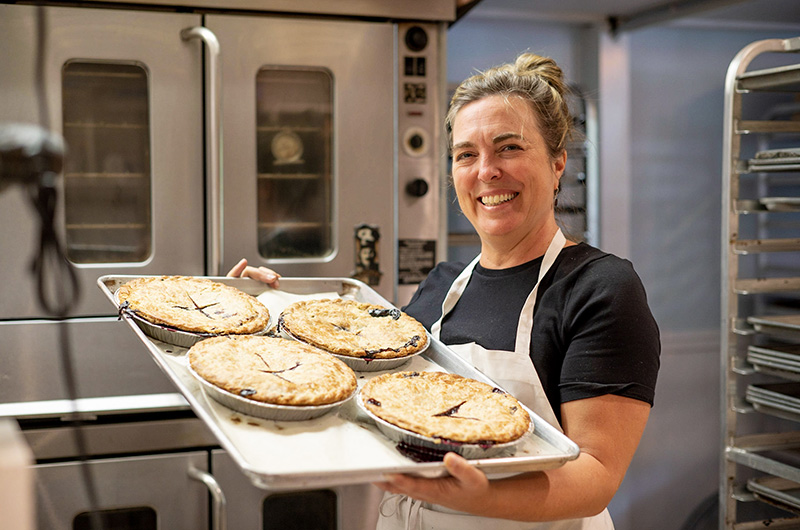At the beginning of the summer, Fantzye Bagels was voted Best New Business in the Best of the Vineyard people’s choice contest. Three months later, owner Elana Carlson is shuttering her bagel business.
Her last West Tisbury Farmers’ Market appearance will be this Saturday, Oct. 1. It is not for lack of demand, said Ms. Carlson, one of a cadre of enterprising young business owners on the Island who have found plenty of customers for their high-quality niche products.
Instead, she and others cite a range of obstacles to success, from a dwindling labor pool to the lack of commercial kitchen space — almost all tied to the high cost of real estate.
“This is not sustainable,” said Rose Willett, proprietor of the North Tisbury Market, Whippoorwill farm stand and The Larder, who has observed the worsening climate for small business over many years. “The community is really going to have to start looking at what options are available. I see people leaving, I see these young entrepreneurs trying to make a go of it. It’s heartbreaking. We are losing that vibrancy and culture.”
Small business owners interviewed by the Gazette — some closing down, some struggling to survive and some gamely adapting — offered many variations on a single theme: it is hard to build a business in a seasonal economy where expenses are rising and labor supply dwindling, even when demand is as strong as ever.
Jefferson Munroe, who founded the GOOD Farm in 2010, relocated his poultry operation to Connecticut in April 2022, in search of an opportunity that could grow.
“We had people who wanted to work with us but didn’t have anywhere to live, so there was a cap on what we could do,” Mr. Munroe said by phone from his off-Island home.
Mr. Munroe was a ubiquitous figure on the Island for more than a decade, an anchor of the farming community and co-founder of The Larder in Vineyard Haven with Daniele Barrick (of the Scottish Bakehouse) back in 2015.
Like others, Mr. Munroe said revenue was not the problem. His final few years on-Island were, in fact, some of his most profitable. But to run a business on the Vineyard demands a lot from an owner, he said. Mr. Munroe said that he worked every day from April to November.
“There wasn’t a situation where we could grow out of the problem,” he said. “It wasn’t really clear where to go.”
Chrissy Kinsman started Pie Chicks Bakery in 2013, and her pies and baked goods now grace the shelves at many Island retailers, along with a regular table at the farmers’ market. In 2020, Ms. Kinsman also expanded into a Vineyard Haven storefront, tucked away off State Road. But now, nine years after opening and with an avid following, she worries she is on the edge of collapse. After-effects of the pandemic, including supply chain issues, combined with the usual Island business stresses, are adding up, she said.
“You couldn’t deal with the letdowns fast enough this summer,” she said. “My vendors were calling me, telling me they were out of everything, and I couldn’t deliver.”
Ms. Kinsman said high real estate prices and the conversion of many homes to short-term rental properties have made it nearly impossible to maintain a labor force.

“Right now, I have 65-year old women and teenagers,” she said, adding that she has been unable to recruit new bakers because the wages she can afford to pay are not enough for employees to pay for Island housing. She has relied on relatives living in her home.
Ms. Willett echoed the familiar refrain of housing costs and employee shortages leading to overwork. She said she has had to resort to subsidizing a small amount of employee housing, but that is a considerable expense for a small business owner. Her solution, like other shop owners, is to roll up her own sleeves and put in long hours.
“I’m at North Tisbury basically every day,” she said.
Many young entrepreneurs begin as food purveyors, using farmers’ markets and direct sales through established stores to build a following and acquire business skills. But to keep going, many said, they eventually need a brick and mortar home, or at the very least a kitchen.
This spring Ms. Willett teamed up with Brook Katzen to purchase and manage The Larder. She said this had a lot to do with its commercial kitchen. Her chef Tyler Potter has been preparing the shop’s charcuterie and preserving her farm’s produce. She has also leased the kitchen out to other local businesses — Yommi, Mimi’s Hittin’ the Sauce and Caribbean Cuisine, to name a few — but the kitchen is already at capacity for tenant users.
In Fantzye’s case, baked goods, especially slow-rising bagels, require specific equipment and amenities that not every commercial kitchen on-Island can offer. Deck ovens allow bakers to store and bake larger batches, and ample refrigerator space is paramount for the cold rise that defines Fantzye’s fermented flavor, she said.
The loss of her commercial kitchen a few weeks ago was a death blow. For now, Ms. Carlson said she will move her equipment into storage and hope for the best and that a new kitchen space becomes available.
“It doesn’t appear that there’s a space for us, but someone could definitely prove me wrong,” she said.
Scottish Bakehouse had served as overnight kitchen space for Olivia Pattison’s Cinnamon Starship enterprise, where Ms. Pattison said she would stay up baking until 3 a.m. just to start setting up for the Farmers’ Market at 6:30 a.m. When possible, Ms. Pattison would also hold pop-up dinners at the Dock Street Coffee Shop in Edgartown, where she worked part-time before Cinnamon Starship launched.
While grateful to Scottish Bakehouse and Dock Street, she was always on the lookout for a more permanent home, she said, and for a time found one, creating Seaweeds on Kennebec avenue in Oak Bluffs.
With Seaweeds, a bar and eatery that Ms. Pattison and co-owner Danielle Pattavina opened in 2019, Ms. Pattision said even their landlords helped out by reducing rent during Covid. But it wasn’t enough to save the business, which closed earlier this year. The building wasn’t winterized, forcing her to operate seasonally when she would have preferred year-round, she said.
Recently, she decided the situation was untenable. This month, she announced that she would be relocating to western Massachusetts where she plans to open a restaurant, The Neon Newt.
“I could never grow, change or evolve my business,” Ms. Pattison said.
Other business owners are finding ways to adapt.
Ben and Erica DeForest announced online that their most recent ventures, The Cardboard Box and Oyster Bar 02557, will be closing at the end of the season. The Red Cat Kitchen, owned by Mr. DeForest and Sarah Omer, will move into the Oyster Bar’s location for the time being, the DeForests said, and the basement venue that now holds The Cardboard Box will go to a new tenant.
The couple said the move comes as they want to focus more on work-life balance.
“Running three restaurants is no easy feat,” the DeForests shared in a Facebook post. “What we found to be at the forefront of our thoughts this past year were time and energy and where/how we choose to spend them.”
Family businesses with Island roots have sometimes been better able to withstand some of these challenges.
Dock Street Coffee Shop, which recently passed from longtime owner Mary Sobel to her daughter Emily Sobel, has managed to stay afloat.
“It’s been a really positive year,” said Emily, who has worked at the diner since the age of ten. While Emily has housing for herself, the shortage precludes her from hiring a fry cook to take her place behind the counter.
“Even 35 dollars an hour is too little to live on here,” she said.
Emily says Dock Street, a year-round establishment, has found recent success in the shoulder seasons.
“We are still hitting eight to ten flats of eggs a day on the weekends,” she said, (a flat is 30 eggs, their standard measure of busy-ness). She hopes that the increase in year-round residents
might bring with it a new set of regulars and a new set of solutions.
The Gay Head Store, a new general store in Aquinnah, has also found success in the off-season.
“It’s been a real success,” said Faith Smalley, who helps run the store with parents Jay and Missy and brother Zachary. Some of their profits come from tour bus day-trippers, while the rest comes from locals who don’t have another general store option so far up-Island.
“It’s been a real game changer out here,” she said.
Community, most small business owners say, is the key to success, with several calling upon each other to help lift up new ventures, as well as on local government to start pursuing solutions.
Molly Coogan, the new owner of Bunch of Grapes Bookstore in Vineyard Haven, recently attended a booksellers conference where she said she received helpful advice from other business owners off-Island.
“I feel re-energized,” Ms. Coogan said. “We’re all facing similar challenges...it was helpful to see how others navigate.”
Ms. Pattison credited both Mary Sobel at Dock Street and Daniele Dominick at Scottish Bakehouse for lending her their spaces when she was first starting out.
“I wouldn’t be where I am if Daniele at the [Scottish] Bakehouse hadn’t let me use their kitchen,” Ms. Pattison said. “Truly supporting local businesses, that’s exactly what that is. If you are in business, ask how can you help people that are coming up.”
Ms. Willett also sees potential for inter-business collaboration.
“I wonder if we can’t put together a coalition of sorts…that can start looking at ways to really address these issues,” she said. “If we don’t start looking at it now, it’s gonna blow up in our faces.”









Comments (20)
Comments
Comment policy »